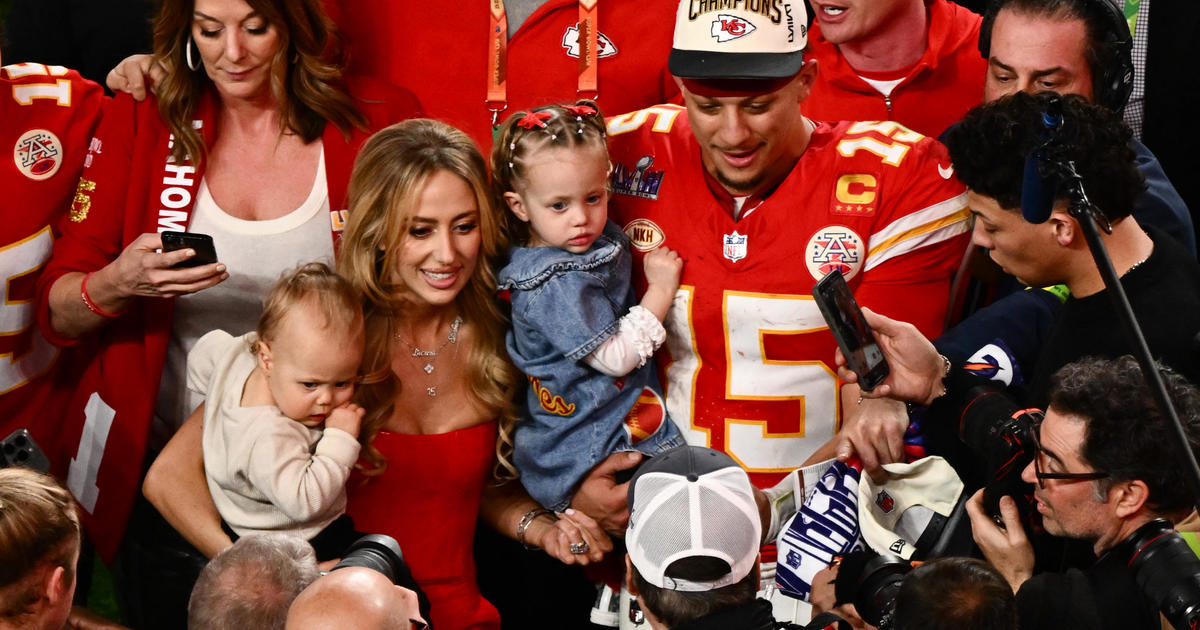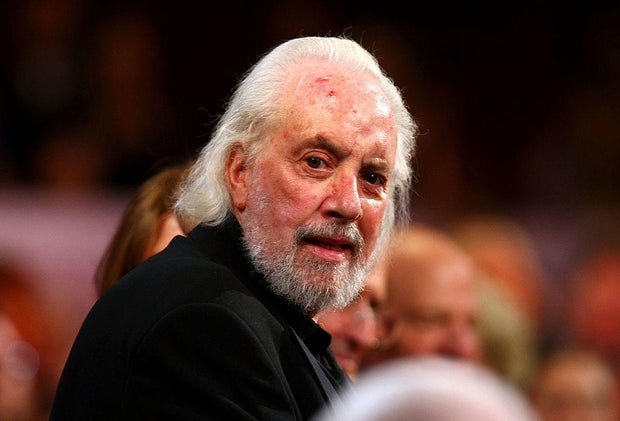CBS News
Brittany Mahomes urges moms to “take care of your pelvic floor.” Here’s why experts agree.

Brittany Mahomes, the wife of quarterback Patrick Mahomes, is urging women to take care of their pelvic floor.
“Just a daily reminder: Once you have kids please take care of your pelvic floor. Seriously,” the 28-year-old mother of two wrote in an Instagram Story last week, signing the message: “From: A girl with a fractured back.”
Though specific details about Mahomes’ case are not publicly known, a fracture from a weak pelvic floor is typically rare, Dr. Fatima Naqvi, the medical director at Atlantic Medical Group Outpatient Obstetrics and Gynecology, told CBS News.
“That’s a major injury, and thank goodness we don’t hear about it often,” she says.
But other more common issues can arise from a weak pelvic floor, experts say, making it an important aspect of overall health.
“(Mahomes) does make a good point to talk about preventative care and that weak pelvic floor muscles can contribute to additional core injuries and fractures,” says Aleece Fosnight, medical adviser at Aeroflow Urology and a physician assistant specializing in sexual medicine, women’s health and urology.
Here’s what to know:
What is the pelvic floor?
The pelvic floor in a female body is a “complex interplay of muscles that hold not just the bony part of the pelvis, but also helps give important support to our internal structures — the uterus, the bladder,” Naqvi explains.
The pelvic floor is not rigid, which makes it “designed perfectly for childbirth,” she adds.
But a range of problems can arise if those muscles and connective tissues are weakened or injured.
“During the labor process, the muscles, everything has to be able to accommodate the birth of the child, so you need the muscles to stretch,” Naqvi says. “…It can cause micro-tears (or) it can cause bigger injury.”
In addition to pregnancy and childbirth, there are also other reasons someone’s pelvic floor might weaken, Fosnight says, including:
- Constipation
- Back and hip injuries
- Weak abdominal and back muscles
- Poor posture
Pelvic floor issues
Almost 1 in 4 women in the U.S. are affected by pelvic floor disorders, according to the National Institutes of Health. It says the three main pelvic floor disorders that women may experience are urinary incontinence, fecal incontinence and pelvic organ prolapse.
Naqvi says it’s normal for pregnant or postpartum women to have trouble holding their urine as they experience changes in their pelvic floor. But while this is fairly normalized, the same issue with gas and stool can also occur, which is less discussed.
“The bladder one, they’ll bring it up,” she says. “The one that they don’t talk about is fecal incontinence or flatus (when you’re unable to restrain your flatulence).”
Pelvic organ prolapse is when organs located in the pelvis region — such as the uterus, bladder and bowel — aren’t sufficiently supported and drop or collapse, pressing onto the vagina. “The resulting pressure may cause a bulge or protrusion through the vaginal canal. This protrusion may be uncomfortable, may make physical activity difficult, and may interfere with sexual functioning,” the NIH explains.
Pelvic organ prolapse is less common than urinary or fecal incontinence, but still affects about 3% of U.S. women. It is also treatable, as are the other pelvic floor disorders. In some cases, using a device to support the bladder, medications or surgery may be recommended to treat prolapse, NIH says.
Research also shows the frequency of pelvic floor disorders increases with age, affecting around 40% of women ages 60 to 79, and about half of those 80 or older. The conditions are also more common in women who have had multiple children.
Even those who haven’t given birth can benefit from having a strong pelvic floor, Fosnight says, noting that everyone should aim for a “strong, relaxed pelvic floor.”
Does pelvic floor therapy work?
Many women benefit from exercises to strengthen these muscles.
“Prevention and optimization after injury are keys to helping your pelvic floor and pelvic organs to function and recover as best as they can,” Fosnight says. “One of the best ways to do this is to make an appointment with a pelvic floor specialist.” This can be a health care provider or a physical or occupational therapist who specializes in pelvic floor disorders.
Naqvi says she often refers patients to pelvic floor therapists if they are still presenting with issues 8 to 10 weeks after childbirth.
“These are therapists that specifically understand the pelvic floor, the anatomy, how to get the muscles to work and regain strength so that they’re able to support the internal structures,” she says. “So it doesn’t necessarily mean you’re going to need medicine or you’re going to need surgery that’s out there for your incontinence, but just doing these things that we can do at home will help.”
For those who may be predisposed to pelvic floor dysfunction, like patients with autoimmune or connective tissue disorders, Naqvi may send them to pelvic floor therapy even prior to issues arising, to try to prevent future problems.
“By sending them there, I know they’re going to get educated on their pelvic floor… (and) start doing exercises early to help strengthen that floor muscle,” she says, noting that access and education are key.
How to strengthen the pelvic floor
One exercise that many may already be familiar with are kegels, which you can try by stopping your urine midstream.
“Those are the muscles you’ve got to exercise,” Naqvi says.
But pelvic floor muscle exercises and stretches are not “one size fits all,” since everyone is unique, Fosnight says.
“Coordination of the core muscles is also key in optimizing your pelvic floor,” she says.
CBS News
7/2: CBS Evening News – CBS News

Watch CBS News
Be the first to know
Get browser notifications for breaking news, live events, and exclusive reporting.
CBS News
Robert Towne, legendary Hollywood screenwriter of “Chinatown,” dies at 89

Robert Towne, the Oscar-winning screenplay writer of “Shampoo,” “The Last Detail” and other acclaimed films whose work on “Chinatown” became a model of the art form and helped define the jaded allure of his native Los Angeles, has died. He was 89.
Towne “passed away peacefully surrounded by his loving family” Monday at his home in Los Angeles, his publicist Carri McClure, told CBS News in a statement. She did not provide a cause of death.
In an industry which gave birth to rueful jokes about the writer’s status, Towne for a time held prestige comparable to the actors and directors he worked with. Through his friendships with two of the biggest stars of the 1960s and ’70s, Warren Beatty and Jack Nicholson, he wrote or co-wrote some of the signature films of an era when artists held an unusual level of creative control. The rare “auteur” among screen writers, Towne managed to bring a highly personal and influential vision of Los Angeles onto the screen.
Alberto E. Rodriguez/Getty Images for AFI
“It’s a city that’s so illusory,” Towne told The Associated Press in a 2006 interview. “It’s the westernmost west of America. It’s a sort of place of last resort. It’s a place where, in a word, people go to make their dreams come true. And they’re forever disappointed.”
Recognizable around Hollywood for his high forehead and full beard, Towne won an Academy Award for “Chinatown” and was nominated three other times, for “The Last Detail,” “Shampoo” and “Greystoke.” In 1997, he received a lifetime achievement award from the Writers Guild of America.
“His life, like the characters he created, was incisive, iconoclastic and entirely (original),” said “Shampoo” actor Lee Grant on X.
Towne was born Robert Bertram Schwartz in Los Angeles and moved to San Pedro after his father’s business, a dress shop, closed down because of the Great Depression. His father changed the family name to Towne.
Towne’s success came after a long stretch of working in television, including “The Man from U.N.C.L.E” and “The Lloyd Bridges Show,” and on low-budget movies for “B” producer Roger Corman. In a classic show business story, he owed his breakthrough in part to his psychiatrist, through whom he met Beatty, a fellow patient. As Beatty worked on “Bonnie and Clyde,” he brought in Towne for revisions of the Robert Benton-David Newman script and had him on the set while the movie was filmed in Texas.
Towne’s contributions were uncredited for “Bonnie and Clyde,” the landmark crime film released in 1967, and for years he was a favorite ghost writer. He helped out on “The Godfather,” “The Parallax View” and “Heaven Can Wait” among others and referred to himself as a “relief pitcher who could come in for an inning, not pitch the whole game.” But Towne was credited by name for Nicholson’s macho “The Last Detail” and Beatty’s sex comedy “Shampoo” and was immortalized by “Chinatown,” the 1974 thriller set during the Great Depression.
“Chinatown” was directed by Roman Polanski and starred Nicholson as J.J. “Jake” Gittes, a private detective asked to follow the husband of Evelyn Mulwray (played by Faye Dunaway). The husband is chief engineer of the Los Angeles Department of Water and Power and Gittes finds himself caught in a chaotic spiral of corruption and violence, embodied by Evelyn’s ruthless father, Noah Cross (John Huston).
Influenced by the fiction of Raymond Chandler, Towne resurrected the menace and mood of a classic Los Angeles film noir, but cast Gittes’ labyrinthine odyssey across a grander and more insidious portrait of Southern California. Clues accumulate into a timeless detective tale, and lead helplessly to tragedy, summed up by one of the most repeated lines in movie history, words of grim fatalism a devastated Gittes receives from his partner Lawrence Walsh (Joe Mantell): “Forget it, Jake, it’s Chinatown.”
The back story of “Chinatown” has itself become a kind of detective story, explored in producer Robert Evans’ memoir, “The Kid Stays in the Picture”; in Peter Biskind’s “East Riders, Raging Bulls,” a history of 1960s-1970s Hollywood, and in Sam Wasson’s “The Big Goodbye,” dedicated entirely to “Chinatown.” In “The Big Goodbye,” published in 2020, Wasson alleged that Towne was helped extensively by a ghost writer — former college roommate Edward Taylor. According to “The Big Goodbye,” for which Towne declined to be interviewed, Taylor did not ask for credit on the film because his “friendship with Robert” mattered more.
The studios assumed more power after the mid-1970s and Towne’s standing declined. His own efforts at directing, including “Personal Best” and “Tequila Sunrise,” had mixed results. “The Two Jakes,” the long-awaited sequel to “Chinatown,” was a commercial and critical disappointment when released in 1990 and led to a temporary estrangement between Towne and Nicholson.
Around the same time, he agreed to work on a movie far removed from the art-house aspirations of the ’70s, the Don Simpson-Jerry Bruckheimer production “Days of Thunder,” starring Tom Cruise as a race car driver and Robert Duvall as his crew chief. The 1990 movie was famously over budget and mostly panned, although its admirers include Quentin Tarantino and countless racing fans. And Towne’s script popularized an expression used by Duvall after Cruise complains another car slammed him: “He didn’t slam into you, he didn’t bump you, he didn’t nudge you. He rubbed you.
“And rubbin,′ son, is racin.'”
Towne later worked with Cruise on “The Firm” and the first two “Mission: Impossible” movies. His most recent film was “Ask the Dust,” a Los Angeles story he wrote and directed that came out in 2006. Towne was married twice, the second time to Luisa Gaule, and had two children. His brother, Roger Towne, also wrote screenplays, his credits include “The Natural.”
CBS News
Analyzing impact of Supreme Court’s Trump immunity decision

Watch CBS News
Be the first to know
Get browser notifications for breaking news, live events, and exclusive reporting.









